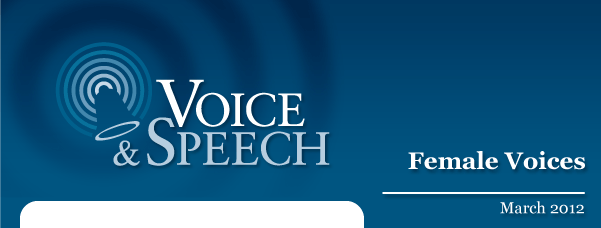|
Female Voices
Common Speech Problems for Women
I’ve often thought about writing an article on common issues with women’s voices, but hesitated, fearing I might bring the wrath of the gender police crashing down on my head. But then I thought, “Hey, as long as I write a companion piece on men’s voices—which might actually be longer, why would anyone accuse me of being unfair?”
Then an article by Katrina Onstad appeared in the Toronto Globe & Mail, “Up High or Down Low: What a woman’s voice says about her,” and I thought, “Okay, it’s out in the open. People are obviously interested. Maybe it’s not the minefield I imagine it to be.” Ms. Onstad didn’t quote any experts, but she obviously did her research. The first problem she identified, having a high-pitched voice, would certainly make my Top-Three list of speech problems for women, so let’s start there.
Having a voice that sounds high is a common problem facing my female clients. Consequently, they fail to project an image of authority and credibility. Listeners tend to associate high voices with youth, inexperience and even weakness. Opinions are dismissed and accomplishments are overlooked. Unfair? Absolutely. But remember, listeners aren’t acting rationally. They respond based on how that voice makes them feel. For strategies to enhance the perception of vocal depth, see the article, “Discovering a Deeper Voice.”

Having a voice that lacks strength or volume would be second issue confronting my female clients. It’s a serious handicap if your listeners routinely struggle to hear what you’re saying. The consequences are very similar to the one’s we’ve just discussed. Yes, there are many situations where a soft, quiet voice might be an advantage, but when the environment becomes more competitive and interactions become more assertive, a small voice is a big problem. For strategies to strengthen your voice, see the article, “Your Strong Voice.”
A third problem facing many female speakers is up-speak, a tendency to pitch the ends of sentences up instead of down. Since it’s a common characteristic of teenagers’ speech, it diminishes the perception of strength, confidence and authority in the communication of adults. In English, up-speak is appropriate for questions (e.g. “Did you like that?”), and for lists (e.g. “I went to the store, the bank, the gym, and then home.”). But statements are generally inflected downward (e.g. “This is the way it’s done.”). When you catch yourself using up-speak, say the phrase or sentence again, deliberately inflecting the tone downward at the end.
|
|
